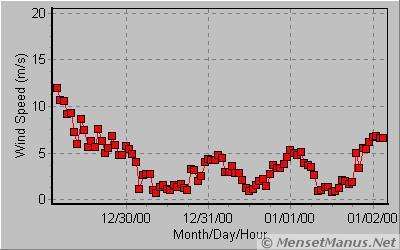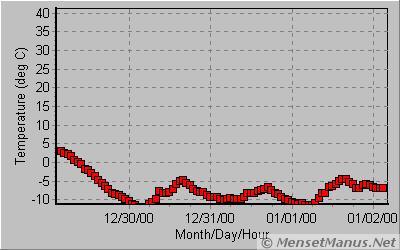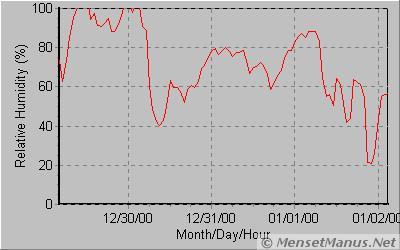[Home] [Windpower Home Page] [Regenesys Dangers] [Directions] [Troubles Nearby] [Dirty] [FOIA] [Ground Zero] [Tour] [Friendly?] [Spinnin'] [Bottom Line - Performance] [Power Calculator] [Basis] [Storage] [Assembly] [Construction] [18 Operating] [Area History] [California Dreamin'] [Texas]
Common sense isn't.
Performance of TVA's Buffalo Mountain Wind Power
Plant
Year End 2001
 As we wait for TVA's
announcement page to be updated with fourth quarter 2001
results, we can ponder the weather data from the last few days of
the year. As luck would have it, after a string of very windy days,
the old year went out, and the new year came in, with a whimper (or
low winds). Below about 4 meters/second (about 9 mph) the wind
turbines can produce no power.
As we wait for TVA's
announcement page to be updated with fourth quarter 2001
results, we can ponder the weather data from the last few days of
the year. As luck would have it, after a string of very windy days,
the old year went out, and the new year came in, with a whimper (or
low winds). Below about 4 meters/second (about 9 mph) the wind
turbines can produce no power.
 Unfortunately, or fortunately, depending on your perspective,
the temperature was also quite low during this time of low wind.
Wind turbines can produce more power with lower temperature, denser
air. So, in a way the wind turbines like cold and windy weather
best, unlike most people. The dense, cold air on the mountain was
not being taken advantage of to make power at a time when power was
needed for heating. In fact, we can be sure that the turbines
themselves were consuming power to keep the precious components
warm.
Unfortunately, or fortunately, depending on your perspective,
the temperature was also quite low during this time of low wind.
Wind turbines can produce more power with lower temperature, denser
air. So, in a way the wind turbines like cold and windy weather
best, unlike most people. The dense, cold air on the mountain was
not being taken advantage of to make power at a time when power was
needed for heating. In fact, we can be sure that the turbines
themselves were consuming power to keep the precious components
warm.
 You may explore the effect of varying temperature and humidity
on the power produced by the turbines, using my TVA
Buffalo Mountain wind power calculator. Of course, variations
in temperature or humidity don't make much difference if the wind
isn't blowing.
You may explore the effect of varying temperature and humidity
on the power produced by the turbines, using my TVA
Buffalo Mountain wind power calculator. Of course, variations
in temperature or humidity don't make much difference if the wind
isn't blowing.
Thanks to
NOAA for the
weather data.
Previous Bottom Line Reports:
November 2001


| Quote of the moment |
| This is ... a trait no other nation seems to possess in quite the same degree that we do—namely, a feeling of almost childish injury and resentment unless the world as a whole recognizes how innocent we are of anything but the most generous and harmless intentions. |
~ Eleanor Roosevelt (1884–1962), U.S. author, speaker, and First Lady. As quoted in Eleanor: The Years Alone, ch. 4, by Joseph P. Lash (1972).
From her “My Day” column, published in the Ladies’ Home Journal on November 11, 1946.
~ |
Thanks to Highland Media
[Home] [Windpower Home Page] [Regenesys Dangers] [Directions] [Troubles Nearby] [Dirty] [FOIA] [Ground Zero] [Tour] [Friendly?] [Spinnin'] [Bottom Line - Performance] [Power Calculator] [Basis] [Storage] [Assembly] [Construction] [18 Operating] [Area History] [California Dreamin'] [Texas]
Common sense isn't.
Images stored locally for protection of your privacy (unless/until you search
with Google).
Disclaimer Fine Print: This site is personal, and is independent
of TVA or any other organization. Use of the abbreviation "TVA" is
purely for descriptive purposes (for example, to distinguish from
wind power plants on Buffalo Ridge in Minnesota). No
endorsement, no approval, and no involvement by TVA
is implied.
Copyright © 2000- hal9000[zat]mensetmanus.net
I last touched this page on
Saturday, 2007-11-17 at 05:09:06 UTC.
W3C Markup Validator Check
Site optimized for any modern browser,
any size screen, any resolution, and no plug-ins; prepared and served with
Free BSD, and
Debian GNU / Linux
 As we wait for TVA's
announcement page to be updated with fourth quarter 2001
results, we can ponder the weather data from the last few days of
the year. As luck would have it, after a string of very windy days,
the old year went out, and the new year came in, with a whimper (or
low winds). Below about 4 meters/second (about 9 mph) the wind
turbines can produce no power.
As we wait for TVA's
announcement page to be updated with fourth quarter 2001
results, we can ponder the weather data from the last few days of
the year. As luck would have it, after a string of very windy days,
the old year went out, and the new year came in, with a whimper (or
low winds). Below about 4 meters/second (about 9 mph) the wind
turbines can produce no power.
 Unfortunately, or fortunately, depending on your perspective,
the temperature was also quite low during this time of low wind.
Wind turbines can produce more power with lower temperature, denser
air. So, in a way the wind turbines like cold and windy weather
best, unlike most people. The dense, cold air on the mountain was
not being taken advantage of to make power at a time when power was
needed for heating. In fact, we can be sure that the turbines
themselves were consuming power to keep the precious components
warm.
Unfortunately, or fortunately, depending on your perspective,
the temperature was also quite low during this time of low wind.
Wind turbines can produce more power with lower temperature, denser
air. So, in a way the wind turbines like cold and windy weather
best, unlike most people. The dense, cold air on the mountain was
not being taken advantage of to make power at a time when power was
needed for heating. In fact, we can be sure that the turbines
themselves were consuming power to keep the precious components
warm. You may explore the effect of varying temperature and humidity
on the power produced by the turbines, using my
You may explore the effect of varying temperature and humidity
on the power produced by the turbines, using my